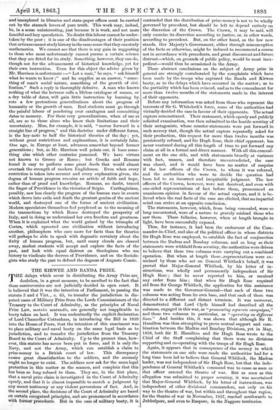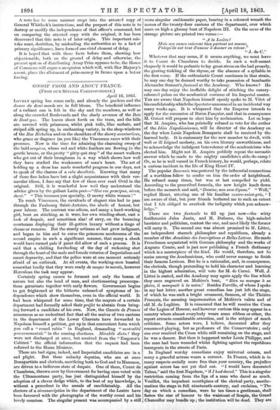THE KIRWEE AND BANDA PRIZE.
prize-money in a British court of law. This discrepancy causes great dissatisfaction to the soldiers, and the anomaly ought no longer to exist. The soldiers now ask for the same legal protection in this matter as the seamen, and complain that this has been so long refused to them. They see, in the first place, that a naval prize claim is investigated in the Court of Admiralty openly, and that it is almost impossible to snatch a judgment by any secret testimony or any violent perversions of fact. And, in the second place, the decisions of the Court of Admiralty are based on certain recognized principles, and are pronounced in accordance with former precedents. But in the case of military booty, it is contended that the distribution of prize-money is not to be wholly governed by precedent, but should be left to depend entirely on the discretion of the Crown. The Crown, it may be said, will only exercise its discretion according to justice, or, in other words, according to precedent. But, on the other hand, as the law now stands, Her Majesty's Government, either through misconception of the facts or otherwise, might be induced to recommend a course not in accordance with precedents, and great discontent and future distrust—which, on grounds of public policy, would be most inex- pedient—would thus be occasioned in the Army.
These abstract conclusions on the subject of Army prize in general are strongly corroborated by the complaints which have been made by the troops who captured the Banda and Kirwee booty, as to the delays which have occurred in the matter ; as to the partiality which has been evinced, and as to the concealment for more than twelve months of the statements made in the interest of their opponents.
Before any information was asked from those who represent the interests of Sir G. Whitelock's force, some of the authorities had virtually decided the case in favour of their opponents. The actual captors remonstrated. Their statement, which openly and publicly solicited examination, was then submitted to the hostile scrutiny of their antagonists, whose counter-statements were put forward in such secrecy that, though the actual captors repeatedly asked for their production, this request for more than twelve months was persistently refused, and Sir Hugh Rose, their chief opponent, has never ventured during all this length of time to put forward any claim at all in a formal and direct manner. With all this conceal- ment on the one side, and with statements broadly at variance with fact, unseen, and therefore uncontradicted, the case was closed, and it would have been no matter of surprise if the law officers of the Crown, to whom it was referred, and the authorities who were to decide the question had been led to an incorrect and inequitable judgment. The law officers of the Crown, however, were not deceived, and even with one-sided representations of fact before them, pronounced an unanimous opinion in favour of the actual captors, and it is be- lieved when the real facts of the case are elicited, that no impartial mind can arrive at an opposite conclusion.
The statements, however, which, from being concealed, were so long uncontested, were of a nature to gravely mislead those who saw them. These fallacies, however, when at length brought to light, have been successfully exposed.
Thus, for instance, it had been the endeavour of the Com- mander-in-Chief, and also of the political officer in whose districts Sir Hugh Rose was employed, to establish the fact of conjunction between the Madras and Bombay columns, and so long as their statements were withheld from scrutiny, the authorities were driven to believe that these two columns were carrying out a combined operation. But when at length these-representations were ex- amined by those who act on General Whitlock's behalf, it was proved that Major-General Whitlock, by his letter of in- structions, was wholly and permanently independent of Sir Hugh Rose ; that he never reported to him, or received any order from him ; that when Sir Hugh Rose required aid from Sir George Whitlock, the application for this assistance was made to the Governor-General—that each of these two columns was acting from its own base, and that each of them was directed to a different and distant terminus. It was moreover, demonstrated that Lord Clyde himself had described all the columns, engaged in this war, as "prosecuting separate campaigns," and these two columns in particular, as "operating on different lines." And besides this, it was shown that although Sir R. Hamilton was thus attempting to prove mutual support and com- bination between the Madras and Bombay Divisions, yet in May, 1858, both Sir R. Hamilton and Sir Hugh Rose wrote to the Chief of the Staff complaining that there were no divisions supporting and co-operating with the troops of Sir Hugh Rose.
Again, it appears that in consequence of the secrecy in which the statements on one side were made the authorities had for a long time been led to believe that General Whitlock, the Madras leader, was not independent of Sir Hugh Rose, but that the inde- pendence of General Whitlock's command was to cease as soon as that officer entered the theatre of war. But as soon as this allegation was submitted to proper scrutiny, it was ascertained that Major-General Whitlock, by his letter of instructions, was independent of other divisional commanders, not only on his way to the theatre of war, but within and throughout that region, for the theatre of war in November, 1857, reached southwards to Jubbulpore, and even to Raepore, in the Nagpore territories.
A note has in some manner crept into the attested copy of General Whitlock's instructions, and the purport of this note is to destroy or modify the independence of that officer's command, but on comparing the attested copy with the original, it has been discovered that this note is of later origin. This important Mis- bile must, doubtless, by misleading the authorities as to a fact of primary significance, have formed one chief element of delay.
It is hoped that with these facts before them, showing how objectionable, both on the ground of delay and otherwise, the present systsm of distributing Army Prize appears to be, the House of Commons -will express an opinion which will, with Her Majesty's assent, place the allotment of prize-money in future upon a better footing.































 Previous page
Previous page